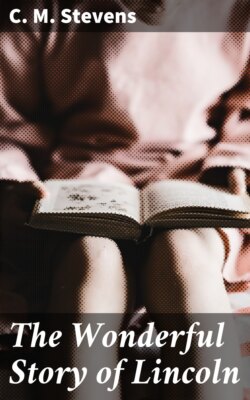Читать книгу The Wonderful Story of Lincoln - C. M. Stevens - Страница 5
На сайте Литреса книга снята с продажи.
II. THE PROCESS OF LIFE FROM WITHIN
ОглавлениеTable of Contents
Standard authorities have already fully recorded Lincoln’s biography and its historical environment. There yet remains the far more difficult, delicate and consequential message from generation to generation, so much needed in patriotic appreciation, to interpret his rise from those vanished social origins, in order that there may be a just valuation of his life by American youth.
The schoolboy learns with little addition to his ideals, or to his patriotism, or humanity, when he reads of a person, born in what appears to be the most sordid and pathetic destitution of the wild West, at last becoming a martyr president. The scenes in the making of Lincoln’s life run by too fast in the reading for the strengthening life-interest to be received and appreciated. The human process of Lincoln’s youth, with its supreme lesson of patience and labor and growth, is lost in considering the man solely as a strange figure of American history. If that life can be separated enough from the political turmoil so as to be seen and to be given a worthy interpretation, there is thus a service that may be worth while for the American youth.
Heroes have been made in many a historical crisis and they represent some splendid devotion to a single idea of human worth, but Lincoln’s heroism was the far severer test of a hard struggle through many years. He came near encountering every discouragement and in mastering every difficulty that may befall any American from the worst to the best, and from the lowliest to the most responsible position.
The poet has expressed these valuations arising through the frailties and vicissitudes of his long, tragic struggle in the following lines:
“A blend of mirth and sadness, smiles and tears;
A quaint knight-errant of the pioneers;
A homely hero born of star and sod;
A Peasant Prince; a Masterpiece of God.”
Lincoln’s life has much more for American youth than the adventure-story of a backwoods boy of pioneer days on his unknown way to be a hero of American history. What Lincoln thought he was and what he made out of his relations with those around him are only incidental to the inspiring patience with which he kept the faith of high meaning within him, and the labor with which he strove on until his ideal came clear as one of the supreme visions of humanity.
Every really ambitious American boy asks himself the question, How did he do it? The probably correct answer is that he didn’t do it. He made himself the right man and the right people did it.
We do not now hear so much of Lincoln as the “fireplace” student, because that word no longer carries so pathetic a vision as it did to the American boy. “Lincoln the railsplitter” has almost disappeared from the phrases of patriotic eulogy for this great American, because the task and significance of railsplitting no longer bear the force of meaning that they did to the boys of Civil-War days. This means that, if the American boy is to receive any inspiration from the early life of Lincoln, there must be achieved some new and more significant form of interpretation from the making of his life and character.
Even the strong description of Edwin Markham becomes more figurative than concrete in its illustration more poetic than material, when he says,
“He built the rail-pile as he built the state,
Pouring his splendid strength through every blow,
The conscience of him testing every stroke,
To make his deed the measure of a man.”
